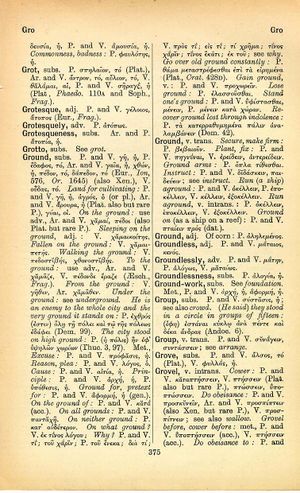ground: Difference between revisions
Δίκαιος ἐὰν ᾖς, πανταχοῦ τῷ τρόπῳ χρήσῃ νόμῳ († λαληθήσῃ) → Si iustus es pro lege tibi mores erunt → Bist du gerecht, ist dein Charakter dir Gesetz (wirst du in aller Munde sein)
m (Text replacement - "<b class="b2">Frag.</b>" to "''Frag.''") |
m (Text replacement - "<b class="b2">Ion</b>" to "''Ion''") |
||
| Line 1: | Line 1: | ||
{{Woodhouse1 | {{Woodhouse1 | ||
|Text=[[File:woodhouse_375.jpg|thumb|link={{filepath:woodhouse_375.jpg}}]]'''subs.''' | |Text=[[File:woodhouse_375.jpg|thumb|link={{filepath:woodhouse_375.jpg}}]]'''subs.''' | ||
P. and V. γῆ, ἡ, P. [[ἔδαφος]], τό, Ar. and V. [[γαῖα]], ἡ, [[χθών]], ἡ, [[πέδον]], τό, [[δάπεδον]], τό (Eur., | P. and V. γῆ, ἡ, P. [[ἔδαφος]], τό, Ar. and V. [[γαῖα]], ἡ, [[χθών]], ἡ, [[πέδον]], τό, [[δάπεδον]], τό (Eur., ''Ion'', 576, Or. 1645) (also Xen.), V. [[οὖδας]], τό. | ||
<b class="b2">Land for cultivating</b>: P. and V. γῆ, ἡ, [[ἀγρός]], ὁ (or pl.), Ar. and V. [[ἄρουρα]], ἡ (Plat. also but rare P.), γύαι, οἱ. | <b class="b2">Land for cultivating</b>: P. and V. γῆ, ἡ, [[ἀγρός]], ὁ (or pl.), Ar. and V. [[ἄρουρα]], ἡ (Plat. also but rare P.), γύαι, οἱ. | ||
<b class="b2">On the ground</b>: use adv., Ar. and V. [[χαμαί]], [[πέδοι]] (also Plat. but rare P.). | <b class="b2">On the ground</b>: use adv., Ar. and V. [[χαμαί]], [[πέδοι]] (also Plat. but rare P.). | ||
Revision as of 13:54, 7 August 2017
English > Greek (Woodhouse)
subs.
P. and V. γῆ, ἡ, P. ἔδαφος, τό, Ar. and V. γαῖα, ἡ, χθών, ἡ, πέδον, τό, δάπεδον, τό (Eur., Ion, 576, Or. 1645) (also Xen.), V. οὖδας, τό. Land for cultivating: P. and V. γῆ, ἡ, ἀγρός, ὁ (or pl.), Ar. and V. ἄρουρα, ἡ (Plat. also but rare P.), γύαι, οἱ. On the ground: use adv., Ar. and V. χαμαί, πέδοι (also Plat. but rare P.). Sleeping on the ground, adj.: V. χαμαικοίτης, Fallen on the ground: V. χαμαιπετής. Walking the ground: V. πεδοστιβής, χθονοστιβής. To the ground: use adv., Ar. and V. χαμᾶζε, V. πέδονδε ἔραζε (Aesch., Frag.). From the ground: V. γῆθεν, Ar. χαμᾶθεν. Under the ground: see underground. He is an enemy to the whole city and the very ground it stands on: P. ἐχθρός (ἐστιν) ὅλῃ τῇ πόλει καὶ τῷ τῆς πόλεως ἐδάφει (Dem. 99). The city stood on high ground: P. (ἡ πόλις) ἦν ἐφʼ ὑψηλῶν χωρίων (Thuc. 3, 97). Met., Excuse: P. and V. πρόφασις, ἡ. Reason, plea: P. and V. λόγος, ὁ. Cause: P. and V. αἰτία, ἡ. Principle: P. and V. ἀρχή, ἡ, P. ὑπόθεσις, ἡ. Ground for, pretext for: P. and V. ἀφορμή, ἡ (gen.). On the ground of: P. and V. κατά (acc.). On all grounds: P. and V. πανταχῆ. On neither ground: P. κατʼ οὐδέτερον. On what ground? V. ἐκ τίνος λόγου; Why? P. and V. τί; τοῦ χάριν; P. τοῦ ἕνεκα; διὰ τί; V. πρὸς τί; εἰς τί; τί χρῆμα; τίνος χάριν; τίνος ἕκατι; ἐκ τοῦ; see why. Go over old ground constantly: P. θάμα μεταστρέφεσθαι ἐπὶ τὰ εἰρημένα (Plat., Crat. 428D). Gain ground, v.: P. and V. προχωρεῖν. Lose ground: P. ἐλασσοῦσθαι. Stand one's ground: P. and V. ὑφίστασθαι, μένειν, P. μένειν κατὰ χώραν. Recover ground lost through indolence: P. τὰ κατερρᾳθυμημένα πάλιν ἀναλαμβάνειν (Dem. 42). v. trans. Secure, make firm: P. βεβαιοῦν. Plant, fix: P. and V. πηγνύναι, V. ἐρείδειν, ἀντερείδειν. Ground arms: P. ὅπλα τίθεσθαι. Instruct: P. and V. διδάσκειν, παιδεύειν; see instruct. Run (a ship) aground: P. and V. ὀκέλλειν, P. ἐποκέλλειν, V. κέλλειν, ἐξοκέλλειν. Run aground, v. intrans.: P. ὀκέλλειν, ἐποκέλλειν, V. ἐξοκέλλειν. Ground on (as a ship on a reef): P. and V. πταίειν πρός (dat.). adj. Of corn: P. ἀληλεμένος.

